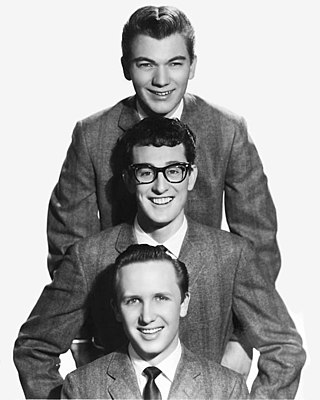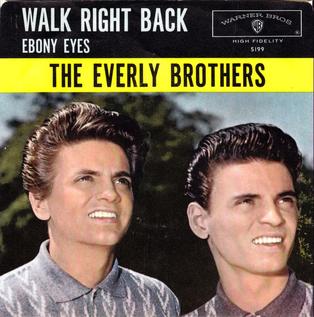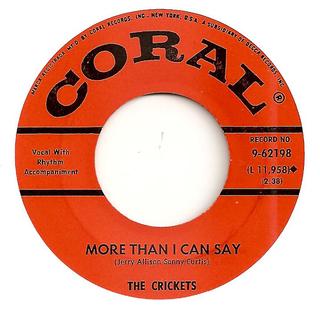
Charles Hardin Holley, known as Buddy Holly, was an American singer, songwriter, and musician who was a central and pioneering figure of mid-1950s rock and roll. He was born to a musical family in Lubbock, Texas, during the Great Depression, and learned to play guitar and sing alongside his two siblings.

The Crickets were an American rock and roll band from Lubbock, Texas, formed by singer-songwriter Buddy Holly in January 1957. Their first hit record, "That'll Be the Day", released in May 1957, peaked at number three on the Billboard Top 100 chart on September 16, 1957. The sleeve of their first album, The "Chirping" Crickets, shows the band line-up at the time: Holly on lead vocals and lead guitar, Niki Sullivan on rhythm guitar, Jerry Allison on drums, and Joe B. Mauldin on bass. The Crickets helped set the template for subsequent rock bands, such as the Beatles, with their guitar-bass-drums line-up, performing their own material. After Holly's death in 1959, the band continued to tour and record into the 1960s and beyond with other band members through to the 21st century.

Robert Gaston Fuller was an American rock singer, songwriter, and guitarist best known for "Let Her Dance" and his cover of the Crickets' "I Fought the Law," recorded with his group The Bobby Fuller Four.

"That'll Be the Day" is a song written by Buddy Holly and Jerry Allison. It was first recorded by Buddy Holly and the Three Tunes in 1956 and was re-recorded in 1957 by Holly and his new band, the Crickets. The 1957 recording achieved widespread success. Holly's producer, Norman Petty, was credited as a co-writer, although he did not contribute to the composition.
"I Fought the Law" is a song written by Sonny Curtis of the Crickets and popularized by a cover by the Bobby Fuller Four, becoming a top-ten hit for the band in 1966. Their version of the song was ranked No. 175 on the Rolling Stone list of The 500 Greatest Songs of All Time in 2004, and the same year was named one of the 500 "Songs that Shaped Rock" by the Rock and Roll Hall of Fame.

Robert Thomas Velline, known professionally as Bobby Vee, was an American singer who was a teen idol in the early 1960s and also appeared in films. According to Billboard magazine, he had thirty-eight Hot 100 chart hits, ten of which reached the Top 20. He had six gold singles in his career.

Jerry Ivan Allison was an American musician. He was best known as the drummer for the Crickets and co-writer of their hits "That'll Be the Day" and "Peggy Sue", recorded with Buddy Holly. His only solo chart entry on the Billboard Hot 100 was "Real Wild Child", issued in 1958 under the name Ivan. Allison was inducted into the Rock and Roll Hall of Fame in 2012.

Buddy Wayne Knox was an American singer-songwriter, best known for his 1957 rock & roll hit song, "Party Doll".

Joseph Benson Mauldin, Jr. was an American bassist, songwriter, and audio engineer who was best known as the bassist for the early rock and roll group the Crickets. Mauldin initially played a double (standup) bass, then switched to a Fender Precision Bass guitar. After several years with the Crickets, he became a recording engineer at Gold Star Studios, the Los Angeles studio which became the "hit factory" for Phil Spector, Brian Wilson, and other major 1960s rock performers.
Thomas Lesslie Garrett known as Snuff Garrett or Tommy Garrett, was an American record producer whose most famous work was during the 1960s and 1970s.
Niki Sullivan was an American rock and roll guitarist, born in South Gate, California. He was one of the three original members of Buddy Holly's backing band, the Crickets. Though he lost interest within a few months of his involvement, his guitar playing was an integral part of Holly's early success. He performed on 27 of the 32 songs Holly and The Crickets recorded over his brief career. He co-wrote a number of his own songs. In 2012, Sullivan was inducted into the Rock and Roll Hall of Fame as a member of the Crickets by a special committee, aimed at correcting the mistake of not including the Crickets with Buddy Holly when he was first inducted in 1986.

This Time is a studio album by American country music artist Waylon Jennings, released on RCA Victor in 1974, at the peak of the outlaw country movement. It was produced by Jennings and Willie Nelson.

"Walk Right Back" is a 1961 song by Sonny Curtis that was recorded by The Everly Brothers, and went to No. 7 on the U.S. Billboard Hot 100 chart. Overseas, the song went to No. 1 on the UK Singles Chart for three weeks. Originally it was the B-side, then it was changed to the A-side.

"More Than I Can Say" is a song written by Sonny Curtis and Jerry Allison, both former members of Buddy Holly's band the Crickets. They recorded it in 1959 soon after Holly's death and released it in 1960. Their original version reached No. 42 on the British Record Retailer Chart in 1960. It has been notably performed by singers Bobby Vee and Leo Sayer.
Jerry Naylor Jackson was an American country and rock and roll artist, broadcaster and inspirational speaker. From late 1961 through 1964 he was The Crickets' lead vocalist and guitarist.

"Love's Made a Fool of You" is a song co-written and originally performed by Buddy Holly. It was later re-recorded by Sonny Curtis and the Crickets, with the lead vocal by Earl Sinks, and famously covered by the Bobby Fuller Four.

I Fought the Law is the second and final studio album by The Bobby Fuller Four. It was released by Mustang Records in February 1966 in stereo and mono. Its title comes from the title track, "I Fought the Law", which had recently become a hit single for the group, eventually charting at #9 on the Billboard Hot 100.

In Style With the Crickets is a rock and roll album by the Crickets. Although it was the band's first release following the departure and subsequent death of their front man, Buddy Holly, it still contains many of the band's most memorable songs and many tracks have also been featured on numerous compilations over the years. Originally released as an LP record on December 5, 1960, the album remained out of print for some time until it was re-released on CD in 1993, with bonus tracks not featured on the original album.

Bobby Vee Meets The Crickets is a cross-over rock and roll album that brings singer Bobby Vee together with the Crickets. It was Vee's 7th album and The Crickets' second release following the departure and subsequent death of their front man, Buddy Holly. The album contains new versions of three songs written by or recorded by Holly—Peggy Sue, Bo Diddley, and Well...All Right—and a host of cover versions of 1950s rock'n'roll songs by artists like Little Richard and Chuck Berry. Originally released as an LP record on July 14, 1962, the album was re-released on CD in 1991, with bonus tracks not featured on the original album.

Something Old, Something New, Something Blue, Somethin' Else is a rock and roll album by the Crickets. It is The Crickets' third release following the departure and subsequent death of their front man, Buddy Holly. As the original cover indicates, the album contains versions of four old songs, four new songs, and four songs with variations of "blue" in the title.













